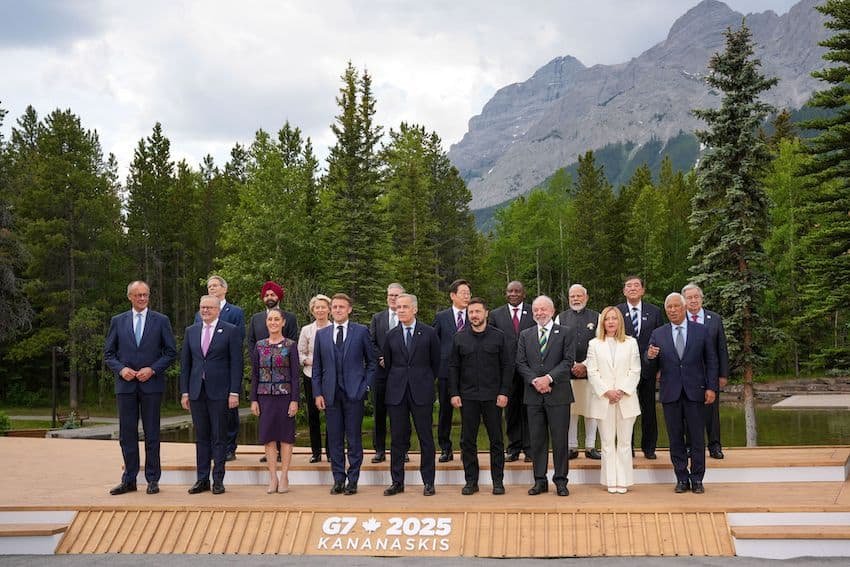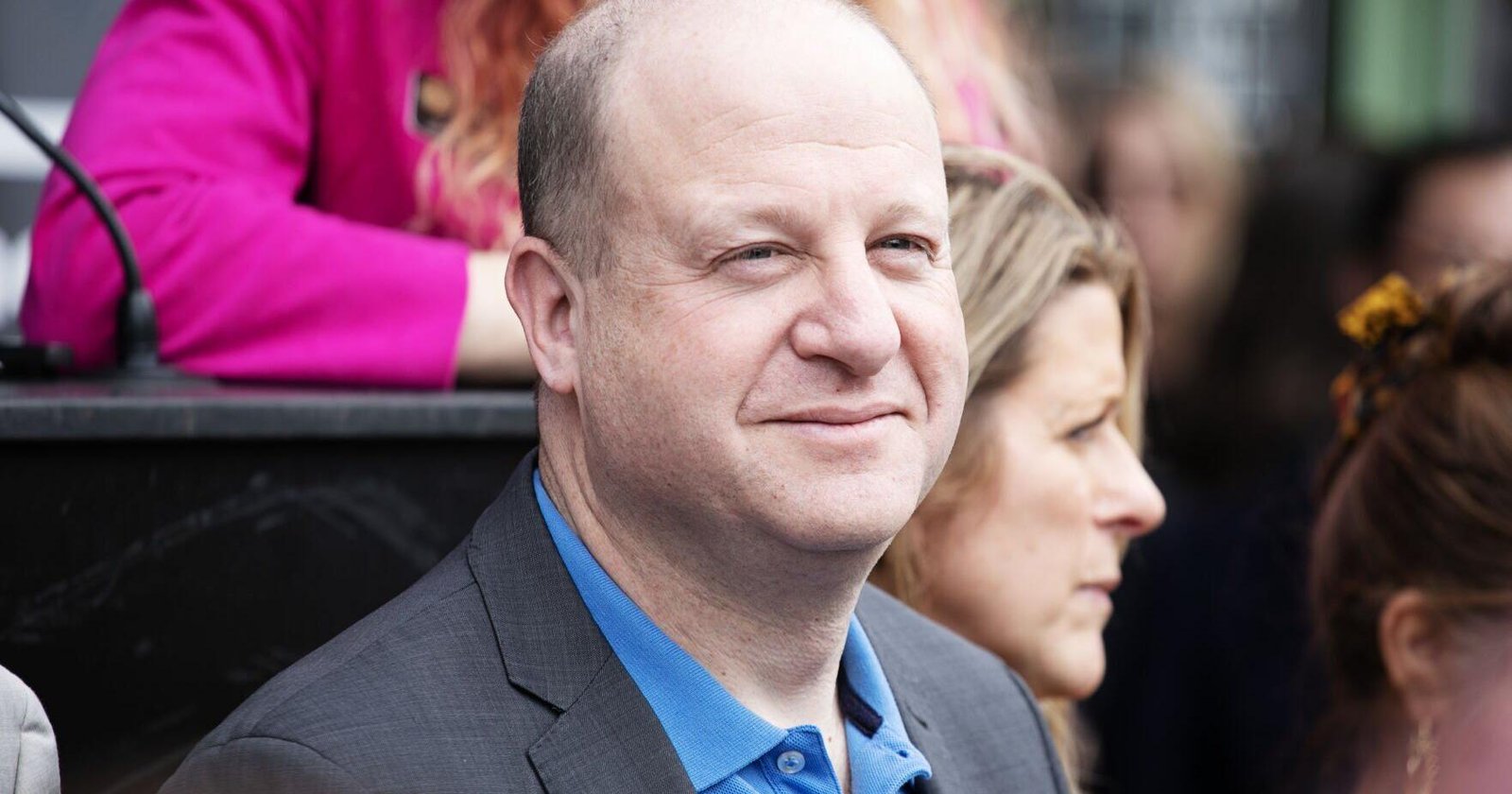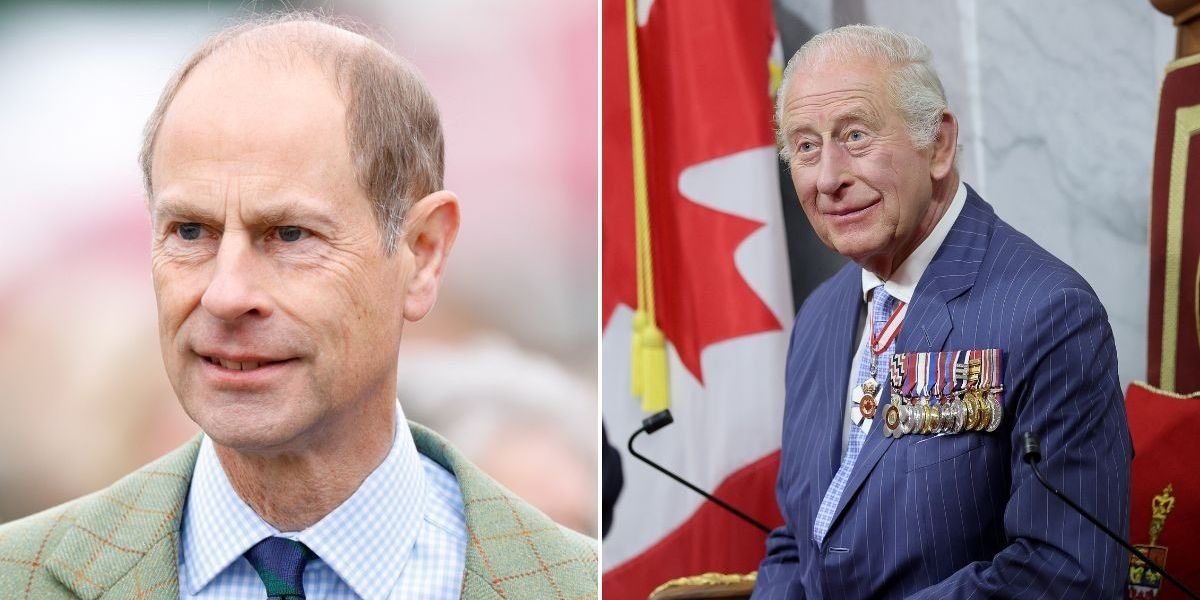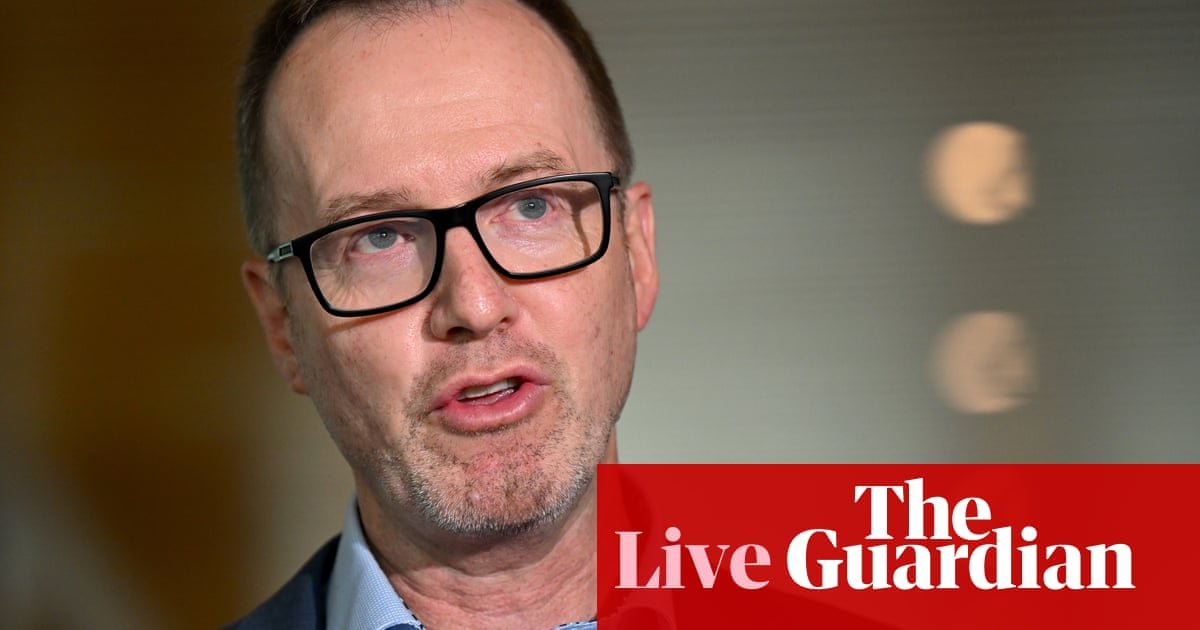President Claudia Sheinbaum proposed the staging of a “Summit for Economic Well-Being” and delivered a staunch defense of Mexicans in the United States during an address to the G7 Summit in Canada on Tuesday.
During a busy day in Kananaskis, Alberta, Sheinbaum also held bilateral talks with several leaders, including Canadian Prime Minister Mark Carney and Indian Prime Minister Narendra Modi.
“They were very good meetings,” she told reporters at her Wednesday morning press conference in Mexico City.
“Mexico is very well received, very well received. It’s not the president of Mexico, it’s Mexico and what our country represents. We were very well received,” said Sheinbaum, who was accompanied at the G7 Summit by Foreign Affairs Minister Juan Ramón de la Fuente, Economy Minister Marcelo Ebrard, Security Minister Omar García Harfuch and other officials.
During an address to the plenary session of the G7 Summit on Tuesday, Sheinbaum proposed the staging of a “Summit for Economic Well-Being,” according to a statement from the president’s office.
She proposed that the summit bring together the G7 countries, the nations that attended this year’s event in Kananaskis as guests, members of the Community of Latin American and Caribbean States (CELAC) and other “interested countries.”
The aim of the summit, according to the government readout of Sheinbaum’s remarks, would be to “strengthen effective cooperation for development [and] for fair and reciprocal trade, as the basis for lasting peace that the whole world longs for.”
“All citizens from all countries must have the possibility of a life with well-being,” the president told fellow world leaders.
“And even though it seems a dream, it’s possible. This would mean progressing toward a more equitable, peaceful and sustainable international community,” Sheinbaum said.
“Economic well-being and cooperation for development are acts of shared responsibility of all nations. In a world marked by interdependencies, no country can isolate itself and prosper at the expense of … others,” she said.
Gracias al primer ministro de Canadá, @MarkJCarney, por la invitación a la Cumbre del G7. pic.twitter.com/hbHVxd26gL
— Claudia Sheinbaum Pardo (@Claudiashein) June 17, 2025
“… This G7 shouldn’t just be a meeting of powers, but rather a space of shared responsibility because power isn’t only measured by what one has, but also by what one does with it,” Sheinbaum said.
She said on Wednesday morning that specific details about the summit she proposed — such as when and where it would be held — have not been determined. Earlier this year, during her attendance at the CELAC Summit in Tegucigalpa, Honduras, Sheinbaum proposed the staging of a “Summit for the Economic Wellbeing of Latin America and the Caribbean.”
On Wednesday, she said that the proposed CELAC summit could be broadened in scope by inviting G7 members and other countries.
During her G7 address, Sheinbaum also spoke about Mexico’s commitment to peace, according to the statement issued by the president’s office.
“Peace doesn’t just consist of the absence of war. It also means the presence of justice, fair trade, opportunities, cooperation for development and respect of human rights,” she said.
“In this context,” Sheinbaum asserted that “it’s fundamental to recognize the people and families who have migrated out of necessity and who contribute significantly to the economies of the countries that receive them,” according to the readout of her remarks.
Among those people are the “hardworking and honest” Mexicans in the United States, she said.
Speaking as U.S. Immigration and Customs Enforcement works to fulfill President Donald Trump’s pledge to carry out the “largest deportation operation in American history,” and after days of intense protests against immigration raids in Los Angeles, Sheinbaum gave an impassioned defense of Mexican immigrants in the United States.
“They’ve built their lives with dignity, they comply with laws, they are [people] of effort and dedication, they pay taxes, they assume responsibilities and they don’t deserve discrimination, but rather respect and recognition,” she said.
However, Sheinbaum added, “the ultimate goal is that people have well-paid employment and access to an honorable life in their places of origin.”
The Mexican president delivered her address to G7 leaders, including French President Emmanuel Macron and United Kingdom Prime Minister Keir Starmer. Trump left the G7 Summit on Monday to attend to the conflict between Israel and Iran, scuttling plans for a bilateral meeting with Sheinbaum on Tuesday.
Not long after flying into Mexico City from Canada, Sheinbaum told reporters on Wednesday morning that she had a “very important meeting” with Canadian Prime Minister Mark Carney on Tuesday.
I had an excellent meeting with @ClaudiaShein at the G7. Canada and Mexico share deep economic ties that support jobs and business in both of our nations. We’re strengthening that partnership on trade, energy, and agriculture to keep North America competitive in the years ahead. pic.twitter.com/9jZjLJN8kp
— Mark Carney (@MarkJCarney) June 18, 2025
“Of course, we agreed to continue working together for the [USMCA] trade agreement, but also to further strengthen the trade, cultural and educational relations between Mexico and Canada [and] the investment of Canadian companies in Mexico, ” she said.
“… Since the call I had with him [in May], we’ve spoken about the agreement so that Mexican workers can go to work in Canada, mainly agricultural workers,” Sheinbaum added.
During her meeting with Carney, the president told the prime minister that Mexico “very much values” its relationship with Canada, according to a statement from the president’s office.
Sheinbaum noted that “a lot of Mexicans also live in Canada” and thanked Carney for the invitation to the G7 Summit.
She gifted the Canadian prime minister a soccer ball made by members of the Wixárika community in Mexico “as a symbol of the friendship between the two countries” and in acknowledgement that, along with the United States, they will co-host the 2026 FIFA World Cup.
Standing beside Sheinbaum, Carney told reporters that it was a “great honor to welcome President Sheinbaum to the G7.”
He said that the “enduring value of the president’s leadership” was “immediately clear.”
Carney also highlighted the “importance of Mexico being at the center of international cooperation.”
“If I may, Madam President, I’m going to quote you [in saying] that ‘there is no progress unless it’s shared.’ And this is the spirit that the president brings, that Mexico brings, and that Canada shares with you,” he said.
Both Sheinbaum and Carney said they supported the idea of holding a trilateral meeting that included Trump. The most recent “Three Amigos” summit, in which former presidents Andrés Manuel López Obrador and Joe Biden and ex-prime minister Justin Trudeau participated, took place in Mexico City in January 2023.
Sheinbaum also held bilateral meetings on Tuesday with Prime Minister Modi of India, German Chancellor Friedrich Merz, European Commission President Ursula von der Leyen, European Council President António Costa and South Korean President Lee Jae-myung.
She said on Wednesday that she had a “very good meeting” with Modi, a powerful leader in the world’s most populous country.
“We also spoke about the importance of strengthening economic ties between India and Mexico, particularly in some sectors like the pharmaceutical industry … [in which India is] very important today, the technological industry in which India is also very important,” Sheinbaum said.
She said that she proposed to Modi the establishment of “investment agreements” between Mexico and India.
In a post to social media, Sheinbaum said that Mexico’s relationship with India would strengthen “through investment in scientific and technological development.”
For his part, Modi said on social media that he congratulated Sheinbaum on her “historic electoral victory” in 2024 that allowed her to become “the first woman president of Mexico in two centuries.”
“We both see an immense potential for the ties between India and Mexico to strengthen even more in the future, especially in sectors like agriculture, semiconductors, critical minerals, health care, among others,” he wrote.
“We also spoke about ways to strengthen ties between our peoples,” Modi said.
Sheinbaum said on social media on Tuesday that she spoke to von der Leyen and Costa about “the update of our trade agreement” with the European Union. She also noted that she invited von der Leyen to Mexico.
The European Commission president said in a social media post directed to Sheinbaum that “Mexico is a key partner for Europe.”
“From tackling climate change to boosting trade and investment, we’re committed to deepening our cooperation. We look forward to signing our modernized [trade] agreement — and visiting you in Mexico!” von der Leyen wrote.
Durante nuestra participación en la Cumbre del G7, llamamos a trabajar con firmeza por la paz; México ha sido históricamente un país promotor del diálogo, del desarme y del respeto a la soberanía de los pueblos. La política se inventó para construir puentes y soluciones. pic.twitter.com/MXQIMRitfZ
— Claudia Sheinbaum Pardo (@Claudiashein) June 18, 2025
Sheinbaum said she spoke to Merz about the “strategic relationship” between Mexico and Germany as well as “opportunities for economic cooperation.”
She said that her discussion with the recently elected president of South Korea focused on “bringing our countries closer and enriching ties between our peoples.”
There is a significant Korean population in Mexico, based primarily in large cities such as Mexico City and Monterrey.
While she missed out on the opportunity to meet Trump face-to-face for the first time, Sheinbaum did speak to the U.S. president by telephone on Tuesday. She said on social media that they “agreed to work together to soon reach an agreement on various issues that concern us today,” among which are U.S. tariffs on imports from Mexico and Mexico’s opposition to the proposed remittances tax in the United States.
At the G7, Sheinbaum appeared between French President Macron and Australian Prime Minister Anthony Albanese in an official leaders’ photo. The leaders of Italy, Japan, Ukraine, Brazil and South Africa were also at the event, as was United Nations Secretary General António Guterres, among other dignitaries.
In a social media post that included the leaders’ photo, Sheinbaum wrote:
“I participate in the G7 Summit in Canada as a representative of an honorable and proud people who love their history, their culture and who have been characterized by being promoters of peace.”
Sheinbaum also posted a photo of her greeting Albanese at the hotel they both stayed at in Calgary, as well as ones showing her posing with President Luiz Inácio Lula da Silva of Brazil and shaking the hand of President Cyril Ramaphosa of South Africa.
In another post, she appeared with members of the Royal Canadian Mounted Police, whom she thanked for accompanying her on “this brief, but productive trip.”
By Mexico News Daily chief staff writer Peter Davies ([email protected])
Mexico’s English-language newspaper
About Us
ADVERTISE WITH MND
SUBMISSIONS
COMMUNITY GUIDELINES
Subscription FAQ’s
Jobs
Contact
Privacy Policy
Mexico News Daily – Property of Tavana LLC
Leave a Comment
Oakland Coffee Shop at Center of Charged DOJ Discrimination Lawsuit – Daily Coffee News by Roast Magazine
Nick Brown | June 10, 2025 
The United States Department of Justice (DOJ) is accusing the owner of an Oakland, California, coffee shop of discrimination after the shop allegedly refused to serve two Jewish customers.
Filed yesterday in the U.S. District Court for the Northern District of California, the suit comes amidst rising political and cultural tensions in the United States against the backdrop of the armed conflict in Gaza.
The DOJ is accusing Fathi Abdulrahim Harara, the owner of Jerusalem Coffee House in North Oakland, of asking customers wearing hats with the Star of David on them to leave the shop on multiple occasions.
In a statement to Daily Coffee News, a lawyer representing Harara characterized the lawsuit as “a political stunt designed to intimidate people who oppose Israel’s genocide and our government’s support of it.”
The DOJ case follows at least two other state-level court cases stemming from the alleged incidents, which date back to 2023. One of those incidents was caught on camera by alleged victim Jonathan Hirsch, who according to a San Francisco Standard report, “has a history of loud public fights.”
The DOJ suit is also notably one of the first major acts from U.S. Assistant Attorney General Harmeet Dhillon, a prominent right-wing lawyer and regular Fox News guest who was tapped by Donald Trump to lead the DOJ’s Civil Rights Division.
“It is illegal, intolerable, and reprehensible for any American business open to the public to refuse to serve Jewish customers,” Dhillon said in a DOJ press release yesterday. “Through our vigorous enforcement of Title II of the Civil Rights Act and other laws prohibiting race and religious discrimination, the Justice Department is committed to combatting anti-Semitism and discrimination and protecting the civil rights of all Americans.”
On the Jerusalem Coffee House website, the shop says it is “directly linked in heart and faith to liberation struggles around the world” while providing “a truly welcoming abode to our people of Palestine, Oakland, the Bay Area and beyond.”
Glenn Katon, who was named in the suit as Harara’s lawyer, said that the coffee shop owner “abhors anti-Semitism.”
“The Trump administration is unabashedly trying to silence voices for Palestinian human rights by branding them as anti-Semitic,” Katon told DCN. “This case by the government is another unfortunate example of the effort to distract Americans from Israel’s atrocities.”
Under Title II, the DOJ can obtain injunctive relief that changes policies and practices to remedy the discriminatory conduct, but it cannot seek monetary damages for individuals identified as the alleged victims of discrimination.
Comments? Questions? News to share? Contact DCN’s editors here. For all the latest coffee industry news, subscribe to the DCN newsletter.
Nick Brown
Nick Brown is the editor of Daily Coffee News by Roast Magazine.
Tags: Donald Trump, Fathi Abdulrahim Harara, Glenn Katon, Harmeet Dhillon, Jerusalem Coffee House, lawsuits, legal issues
E-News Subscribe
Leave a Comment
Leave a Comment
Doubts creeping in at Barcelona about captain's long-term fitness; player's physical condition raise alarms – Barca Universal
The new Eto’o – Barcelona may have found the next big thing from La Masia
Tactical shift at Barcelona will limit club veteran’s involvement next season
Nico Williams’ transfer to Barcelona would trigger major role change for Hansi Flick favourite
Barcelona consider exit of 22-year-old forward a done deal despite complications
Childhood photos of Barcelona target wearing Blaugrana colours surface
What must Barcelona do to register Joan Garcia and Nico Williams?
Barcelona’s transfer trap – No market for fringe players while top names refuse to leave
To keep or sell – What should Barcelona do with defensive ace amid Premier League interest?
Three ways Barcelona can line up with Nico Williams
Three reasons why Barcelona should sell €60 million-rated midfielder
Three takeaways from Athletic Club 0-3 Barcelona
Pedri 8.5, Lewandowski 9 | Athletic Club 0-3 Barcelona: Player ratings
Christensen, Casado start in a 4-2-3-1 – How Barcelona can line up against Athletic Club
Three talking points ahead of Athletic Club vs Barcelona | La Liga GW 38
Three talking points from Barcelona 2-3 Villarreal
Five reasons why Joan Garcia will prove to be an ideal signing for Barcelona
Keep, loan or sell: Analyzing Barcelona’s best road ahead with talented youngster
Barcelona’s Unsung Heroes: Under-the-radar stars who made a difference this season
Raphinha signs until 2028 – How he’s evolved at FC Barcelona in three seasons
Barcelona’s youth revolution takes centre stage: They are here to dominate
To keep or sell – What should Barcelona do with defensive ace amid Premier League interest?
Five reasons why Joan Garcia will prove to be an ideal signing for Barcelona
Barcelona’s Unsung Heroes: Under-the-radar stars who made a difference this season
Hansi Flick: The architect of Barcelona’s domestic treble triumph
Six defining moments from Barcelona’s La Liga title triumph
Ranking all 15 La Masia talents that made their Barcelona debut under Xavi
Barcelona talented La Masia graduate’s market value rises to €75 million
Barcelona delighted with the progress of 15-year-old La Masia talent – report
‘La Masia is the essence of Barça’ – Barcelona academy gem reacts after La Liga debut
Deco wants to build Barcelona’s future with La Masia
Published
on
By
Marc-Andre ter Stegen’s future has become a hot topic at Barcelona this summer, as the club look to make new signing Joan Garcia their number one goalkeeper next season.
Barcelona, therefore, are actively looking for suitors for ter Stegen, knowing his presence could be more of a liability at the club, both from a sporting and an economic perspective.
Ter Stegen, for his part, is determined to continue at Barcelona and is furious at the club for trying to force him out of Camp Nou. However, the German is not being helped by his injury condition.
According to Catalunya Radio, serious doubts have emerged within Barcelona regarding Ter Stegen’s long-term fitness.
The club are particularly concerned about his knee, the same one he injured back in 2018.
At the time, Ter Stegen spent over a year and a half playing through chronic pain before eventually undergoing arthroscopic surgery.
The injury seems to have reappeared, and this time, the situation may be even more delicate. The club, therefore, do not believe the German is ready for full-intensity competition.
While there’s hope he can regain full fitness, it would take time and, more crucially, a consistent run of minutes, something that Barcelona are currently unable to guarantee.
As mentioned earlier, Barça have identified Joan Garcia as their main-choice goalkeeper and keeping that in mind, the club are not in a position to offer him anything more than a second-fiddle role.
But with ter Stegen also looking to remain Germany’s number one for the FIFA World Cup 2026, that won’t be an option for Barcelona either.
A move away from Camp Nou, therefore, could be the most logical decision for the former Gladbach shot-stopper.
The new Eto’o – Barcelona may have found the next big thing from La Masia
Tactical shift at Barcelona will limit club veteran’s involvement next season
Nico Williams’ transfer to Barcelona would trigger major role change for Hansi Flick favourite
Your email address will not be published.
Achievements • Privacy Policy • Cookie Policy • Licensed Images •
Copyright © 2017 – 2024 Barca Universal – info@barcauniversal.com
Leave a Comment
GOP House members from Colorado call on Polis to end health care funding for 'illegal immigrants' – ColoradoPolitics.com
Welcome to the Denver Gazette
Subscribe to stay up to date with all things Colorado.
Streak: 9 days i
Stories you’ve missed since your last login:
Stories you’ve saved for later:
Recommended stories based on your interests:
Colorado Gov. Jared Polis announces Boulder will be the host city of the Sundance Film Festival starting in 2027 at a press conference on March 27, 2025, in Boulder.
Colorado Gov. Jared Polis announces Boulder will be the host city of the Sundance Film Festival starting in 2027 at a press conference on March 27, 2025, in Boulder.
Three Republican members of Colorado’s delegation to the U.S. House of Representatives are urging Gov. Jared Polis to work with legislators to end state spending on health care coverage for undocumented immigrants — or risk losing hundreds of millions of dollars in federal funding.
“We write to you expressing grave concerns over Colorado’s continued policy of covering illegal immigrants with state Medicaid funds — prioritizing benefits for those unlawfully present in our country over citizens who need it the most: individuals with disabilities, single mothers, children, and seniors,” U.S. Rep. Gabe Evans wrote in a letter delivered to the Democratic governor on Thursday. The letter was also signed by U.S. Reps. Lauren Boebert and Jeff Crank.
“We ask that you join us in protecting Medicaid and work with the State Legislature to overturn existing laws and programs that prioritize illegal immigrants over American citizens with the provision of free or subsidized health care or other benefits,” Evans and his co-signers added.
In response, a spokeswoman for Polis told Colorado Politics that Evans and his colleagues were trying to “distract” from their votes on a Republican budget plan a study cited by the governor’s office says could jeopardize health care coverage for more than 400,000 Coloradans while leading to higher health insurance costs for everyone.
The Republican lawmakers noted that the House-passed version of the GOP’s massive tax and spending bill — known as the “One Big, Beautiful Bill Act” — includes a provision to penalize states that spend state funds to cover immigrants who aren’t eligible for federal health care programs.
Under the bill, which is under consideration in the Senate, these so-called “sanctuary states” would see their share of federal matching funds to cover expanded Medicaid coverage drop from 90% to 80% starting in 2027. That could cost Colorado nearly $2.3 billion from 2028 to 2034, according to an estimate prepared by the Center on Budget and Policy Priorities, a progressive-leaning nonpartisan policy center.
“As you know, this change would pose significant budgetary challenges to Colorado — but only if the state continues to pursue this policy,” Evans and his fellow Republicans wrote.
While undocumented immigrants don’t qualify for federally funded health care, Colorado and 13 other states and the District of Columbia spend state funds to provide coverage for some immigrants.
In Colorado, the OmniSalud program provides subsides to buy private insurance, and Cover All Coloradans, which resembles Medicaid, covers roughly 13,000 children and 5,000 pregnant women irrespective of their immigration status.
According to estimates, OmniSalud is expected to cost $20 million this year and Cover All Coloradans has a price tag of over $50 million.
“Each new dollar that we choose to invest in care for illegal immigrants is a dollar that could go to supporting long-term care for seniors or keeping our rural hospitals open,” Evans, Boebert and Crank said in their letter.
Shelby Wieman, Polis’ press secretary, said in an emailed statement that Evans and the others are misguided.
“Gov. Polis is disappointed these three lawmakers are trying to gut Medicaid and kick people off private insurance, which would raise insurance costs for everyone who buys commercial insurance because of cost-shifting,” Wieman said.
“Thanks to their votes — which they’re trying to distract from — nearly 400,000 Coloradans would lose health care, which would also raise costs for everyone else,” she said. “Gov. Polis continues calling on the Senate to start from scratch with this terrible bill, including truly protecting Medicaid and extending critical subsidies for those who purchase plans off the health exchange so Coloradans can afford health care.”
Although Colorado’s fourth Republican U.S. House member, U.S. Rep. Jeff Hurd, didn’t sign the letter, his office told Colorado Politics that the lawmaker believes Medicaid funding should be spent on vulnerable groups originally targeted by the legislation.
“Medicaid funding must be used to cover those the program was originally created to protect, pregnant women, children, and the disabled,” a Hurd spokesman said in a text message. “Rep Hurd looks forward to supporting our state legislators in ensuring Colorado works with the federal government to accomplish this.”
A new report warns that proposed GOP budget cuts could cost 450,000 Coloradans their Medicaid coverage, with safety net hospitals and young adults among the hardest hit.
{{description}}
Email notifications are only sent once a day, and only if there are new matching items.
Your comment has been submitted.
Reported
There was a problem reporting this.
Log In
Post a comment as Guest
Keep it Clean. Please avoid obscene, vulgar, lewd, racist or sexually-oriented language.
PLEASE TURN OFF YOUR CAPS LOCK.
Don't Threaten. Threats of harming another person will not be tolerated.
Be Truthful. Don't knowingly lie about anyone or anything.
Be Nice. No racism, sexism or any sort of -ism that is degrading to another person.
Be Proactive. Use the 'Report' link on each comment to let us know of abusive posts.
Share with Us. We'd love to hear eyewitness accounts, the history behind an article.
Colorado Politics is published both in print and online. Our website features subscriber-only news stories daily, designed for public policy arena professionals. Member subscribers also receive the weekly print edition of our award-winning newspaper, containing outstanding features and news stories, in their mailboxes every Saturday.
Secure your subscription to Colorado’s premier political news journal, in continuous publication since 1898. You can be in the know right alongside Colorado’s political insiders. Want the real scoop? Subscribe to Colorado Politics today!
Your browser is out of date and potentially vulnerable to security risks.
We recommend switching to one of the following browsers:
Leave a Comment
Leave a Comment
Australia news live: US bombing of Iran a ‘blatant breach of international law’, Greens leader says – The Guardian
This blog is now closed
Albanese government criticised for ‘weak’ response to US attacks on Iran as experts decry ‘flagrant breach’ of law
Get our breaking news email, free app or daily news podcast
The US bombing of Iran represents a “fundamental threat to world peace” and Australia must distance itself from the attack, leader of the Greens Larissa Waters said.
In a statement published today, Waters said Australia could not allow itself to be dragged into “another brutal US war in the Middle East” and said the US strikes were a “blatant breach of international law”.
Waters said the escalation was a “terrifying and catastrophic escalation by the USA, and Australia must condemn it”:
From Iraq to Afghanistan, we have seen Australia follow the US into devastating and brutal wars that have done untold damage to the people of the Middle East. We know that you cannot bomb your way to peace.
Australia must always work for peace and de-escalation. Australia is not powerless, and we cannot be involved in another brutal war in the Middle East.
Australia must take this opportunity to get out of Aukus, have an independent foreign policy that centres peace, and must not allow the use of Australian US military bases like Pine Gap in this conflict.
Only when countries like Australia push back and hold to principles and international law and back them up with material actions, will there be a chance for peace.
Senator David Shoebridge, the Greens spokesperson on defence and foreign affairs, said the world was “at a crossroads” and “the Albanese government must choose to be a force for peace not for war”:
With US president Trump’s bombing of Iran showing clearly that he is no friend of peace, and the Albanese government must distance Australia from these actions.
With that we’re wrapping up the blog. The US strike on Iran, the likely consequences for the Middle East and the global order have, of course, dominated the discussion today. Here’s a quick recap.
President Donald Trump announced about 10am AEST that the US had bombed nuclear sites in Iran, including the Fordow nuclear site. The strike was carried out by US stealth B2 bombers, in coordination with the Israeli leadership.
The Australian government has called for “de-escalation, dialogue and diplomacy” in the Middle East and warned Australians the security situation in the region remains volatile.
The Coalition says it “stands with the United States of America today” in a statement supporting the attacks.
The Greens say the bombing of Iran is a “flagrant breach” of international law and called upon the government not to be dragged into another brutal conflict in the region.
Crowds have gathered in Sydney and Melbourne for pro-Palestinian protests.
We’ll pick things up again tomorrow.
NSW building regulator to get $145.1m injection
Returning again to domestic Australian politics, New South Wales’ building regulator will receive a $145.1m cash injection over the next four years in the 2025-2026 state budget to better fund compliance initiatives.
The funding will go to allowing for the digitisation of penalty infringement notices, to better allow the regulator to perform more targeted inspections, and more prosecutions.
It will also be used to fund taskforces in coordination with the with Fair Trading, Asic, ASQA (Australian Skills Quality Authority) and the NSW State Coroner, to ensure all necessary prosecutions across different jurisdictions can be carried out.
The minister for building, Anoulack Chanthivong said the funding bump showed that the Minns government was working to ensure build quality.
Ensuring homes, whether they be apartments or free-standing houses, are built to the highest standards is critical to helping address the housing crisis we inherited in NSW.
To do this, the NSW government established Building Commission NSW as a dedicated regulator with the aim of restoring confidence in the construction sector and ensuring building quality is improved across the state.
Commissioner, James Sherrard said the regulatory had already carried out “thousands” of inspections across the state and the funding boost “will provide the Commission the funding security it needs to keep inspections going and ensure building quality is maintained across the state.”
It will also allow us to continue to progress key building legislative reforms, and deliver education to the industry, so the sector is supported and can continue to improve into the future.
Federal Labor ministers at odds over contentious NT gas pipeline decision, internal document shows
Senior Albanese government ministers disagreed over whether a controversial Northern Territory gas pipeline should be allowed to go ahead without being fully assessed under national environment laws, an internal document shows.
An environment department brief from February shows representatives for the agriculture minister, Julie Collins, and the Indigenous affairs minister, Malarndirri McCarthy, were concerned about the impact of the Sturt Plateau pipeline’s construction on threatened species and First Nations communities.
A delegate for Collins argued the development should be declared a “controlled action”, a step that indicates it was likely to have a significant impact on a nationally important environmental issue and required a thorough assessment under federal law.
The brief, released under freedom of information laws, shows this was not accepted by the department, acting on behalf of the then environment minister, Tanya Plibersek. It concluded the pipeline did not need a national environmental impact statement before going ahead.
For more on this story, read the full report by Guardian Australia’s Adam Morton and Lisa Cox.
Heckler interrupts Hastie
A press conference held by Andrew Hastie has been interrupted by a protester who has heckled the shadow defence minister, accusing the US of engaging in an illegal war and asking whether there was any evidence to justify US attacks.
The press conference is Hastie’s third statement on the conflict today, including an earlier appearance on ABC Insiders and a joint-statement issued with Coalition leader Sussan Ley.
Hastie sought to cast the US attack on Iran as a “necessary action”:
President Trump gave the offer of negotiations, and over the last two days, the Iranians have not taken up that offer. So the Coalition stands in solidarity with the Iranian people. We regret the loss of life in Iran and Israel, and we hope for a peaceful settlement going forward.
Hastie was interrupted by the heckler who challenged the shadow defence minister over the Coalition’s position.
He added that there was “always a risk” that the conflict may escalate further:
War is the one area of public policy that you can’t control. Wars can really get out of control. And I think there’s also a risk that if the Iranian regime falls, we’ll see a mass movement of people out of Iran into places like Europe. So there’ll be refugees. And then there is the question of who fills the vacuum. If the regime collapses. And we’ve seen what happened to Iraq with Isis, we saw what happened in Afghanistan as well. So these are very difficult and tricky times ahead. But the Coalition wants peace. We want a peaceful settlement.
And I think we can hopefully move forward now that the three key facilities have been targeted. But then again, we have to wait for the battle damage assessment that will come out over the coming days.
No senior members of the Albanese government have fronted cameras to speak about the US attacks on Iran but the government issued a statement a few hours ago attributable to an unnamed spokesperson.
Fears for Iranian civilians
In the wake of the United States bombing of Iranian nuclear facilities, Australian Iranians’ fears for friends and family in their ancestral homeland are growing, not only over aggression from the US but from the nation’s weakened government.
Kambiz Razmara, the vice-president of the Australian-Iranian Society of Victoria, said Donald Trump’s intervention had added to the fear and trauma experienced by Iranian people while intensifying pressure on the Iranian government:
We are devastated by what we see and the suffering of people … if in light of the devastations, no change is brought about in Iran, then all the suffering would only serve the purposes of those who brought on the war, as we are certain that oppression would further escalate in Iran.
To me as I process the information, [Trump] has asserted his control and, at the very least, the crumbs of his deal making should be the freedom of our people.
Now that they’ve done it, [the US] cannot back off the regime, because it would be terrible for our people.
Razmara’s community in Melbourne have much greater fear at how a vulnerable Iranian government might treat its people than a US invasion, he said.
Trump’s call for peace after announcing the bombing raised the prospect of a peace deal, which Razmara feared could leave the Iranian government empowered to treat its citizens more aggressively:
I just feel so desperate that the reality of what we are facing … for our Iranian communities in Iran, is just further devastation, further oppression, because [the government is] going to double down, so it’s just no win situation for the Iranians.
‘Israel is doing the world’s work,’ Tony Abbott says
Tony Abbott has become the latest former Australian prime minister to react to US strikes against Iran:
Israel is doing the world’s work in trying to destroy forever the Iranian nuclear weapons programme and it’s good that America has supported its ally.
Zionist Federation hails US strikes
The Zionist Federation of Australia has welcomed US strikes on Iran as a “necessary and courageous response to an urgent threat”, claiming that Iran has “pursued nuclear weapons while sponsoring terrorism that has killed thousands of Israelis, Americans and others across the world”:
Iran’s actions are not just a danger to Israel, they are a clear and present threat to the West and to the international rules-based order. We commend President Trump and the United States for their moral clarity and leadership in taking decisive action to prevent Iran from acquiring a nuclear weapon.
The Zionist Federation of Australia stands in full solidarity with Israel and the United States, and thanks all those working to confront the Iranian regime’s aggression and protect global security. We hope these actions help pave the way for a more stable and peaceful Middle East.
‘What will happen to Iranian people?’
Australian advocate Rana Dadpour has made contact with friends and family in Iran after losing connection from them for two days. They were anxiously awaiting their government’s next move, she said, and fearing the repercussions, whether the Islamic Republic retaliates against the US or pursues peace.
Nuclear leaks and radiation from the destroyed sites were the most pressing concern for those living nearby, with distrust for official advice driving some to seek help online, Dadpour, co-founder of advocacy organisation AusIran, said.
But others further from the three facilities feared the government would accelerate executions of political prisoners, while arrests were surging once more amid the war as police accused people of spying for Israel:
Right now, they are even more scared of the regime, because now they feel like it has been crushed on so many fronts, and the only side that it can turn to and take revenge [is] Iranian people, because they are not armed. They don’t have any means to protect themselves.
Dadpour, a former Iranian citizen, left the country after feeling her life was at risk after her involvement in peaceful protests. She said people living in Iran felt little optimism whether the government fought back or sued for peace:
If the regime decides to retaliate, and bring on another crisis … then what will happen to Iranian people? Will there be more bombs falling on them?
[Or] if the regime in Iran decides for any reason to sit [at] the table and negotiate, then … people are again being left alone with a regime that is now hurt and weakened, and [its] primary target will be Iranian people again.
‘A flagrant breach of anything that resembles legality’
Allan Behm, a special adviser at the Australia Institute thinktank, said the US decision to bomb Iranian nuclear sites was a “flagrant breach” of the international rules-based order.
Behm, a former adviser to the now foreign minister, Penny Wong, told Guardian Australia:
America has held the leadership of the free world since the end of the second world war, and one of the legacies of American leadership has been what we love to call the international rules based order. This is, I think, a flagrant breach of anything that resembles legality in the conduct of international relations.
The Americans had no reason to go and bomb Iran. They did it because they could, in the same way that Israel, which might have had a little bit more of a reason, but I don’t think it had sufficient reason to use armed force.
‘That would be a tragic lack of sovereignty’
David Shoebridge also attacked the Albanese government over its “moral failure”, both in its statements and practical actions, to distance itself from the US actions, including leaving Aukus, removing US bases from Australian soil and ending the two-way arms trade with Israel:
Of course we hold concerns that just like with other attacks in the region, that Pine Gap may have helped deliver this illegal attack on Iran.
The Albanese government may not have been told by the US government what use they’re making of those so-called joint facilities in Australia. That would be a tragic lack of sovereignty by Australia.
But the Albanese government should make a clear statement that no military base in Australia, whether joint, a joint military base with the United States or otherwise, will be used for this unfolding US war, the third US war in the Middle East in this century.
Leave a Comment
Canadians are ‘leading’ in LGBTQ2 support amid global declines: Ipsos – Global News
Instructions:
Want to discuss? Please read our Commenting Policy first.
If you get Global News from Instagram or Facebook – that will be changing. Find out how you can still connect with us.
Support for LGBTQ2 rights and visibility remains strong among Canadians and has increased over the past year, a new poll suggests, even as global attitudes continue to decline.
Data released Friday by Ipsos in its annual Pride Report showed Canada was among the few nations where support has gone up among 26 countries surveyed, although that support is lower than levels seen in 2021.
“Canada does appear to be leading in its support on a whole range of metrics,” said Sanyam Sethi, vice-president at Ipsos Public Affairs.
The report found nearly eight out of 10 Canadians surveyed said they support same-sex marriage or legal recognition, that same-sex couples should have the same right to adopt children as heterosexual couples, and that LGBTQ2 people should be protected from harassment and discrimination in employment, housing and access to businesses.
Globally, between 60 and 75 per cent of respondents supported those same positions.
Canadians were also found to be more supportive of LGBTQ2 visibility, with majorities or pluralities approving of public displays of affection, being open about their sexual orientation or gender identity, and seeing more openly LGBTQ2 people on screen, in sports and promoted within companies and brands.
Those attitudes were also above the global average, sometimes as much as 10 points.
Although support for transgender rights in Canada was slightly below that for gay, lesbian, bisexual or non-binary people, Ipsos found it remains well above the global average and has also increased slightly since last year.
“It’s really a breath of fresh air, especially when we look around the world and see in lots of places there’s actually a rollback of rights and negative opinions are increasing, to see that Canada is still holding strong,” said Carmen Logie, a University of Toronto professor and the Canada Research Chair in global health equity.
Twelve per cent of Canadians identify as LGBTQ2, Ipsos said.
Canada joined Ireland, Thailand, Spain, Argentina and Mexico as the few countries that saw support increase over the past year, despite remaining below 2021 levels.
However, those countries regularly outpaced Canada across all questions asked by Ipsos.
The report also noted a widening gender gap for support of LGBTQ2 rights and visibility depending on age.
While baby boomers and Gen X men and women were largely aligned in their support, those attitudes diverged among millennials and especially Gen Z, the poll found, with more young women supporting LGBTQ2 issues than young men.
That was true in Canada as well, with Gen Z women sometimes outperforming their male counterparts by as much as 20 points on some questions.
Sethi said Ipsos has found similar gender divides among Gen Z Canadians on other issues as well, beyond LGBTQ2 rights.
“This is a generation growing up together but not seeing eye-to-eye on most issues,” she said.
Canadian support on all questions posed by Ipsos is also well above levels reported in the United States, where the Trump administration has undertaken sweeping measures against diversity initiatives in government, education and business.
On many issues — including same-sex marriage, which has been legal for a decade in the U.S. — American support has dropped over the past year and is down overall from 2021, the data suggests.
Fewer Americans even said they had an LGBTQ2 friend, relative or co-worker when asked compared to last year, while Canada and other countries saw gains.
Shelley Craig, a professor at the University of Toronto and the Canada Research Chair on sexual and gender minority youth, noted U.S. media and political narratives — particularly those seen in the 2024 election cycle — have spread in Canada as well.
She said those attitudes have taken the form of online misinformation, hate speech and attacks on LGBTQ2 people in recent years.
“We’re seeing more Canadians than before who might have been assuming everything was fine speaking up a little bit more, and I think that is part of the bounce back we’re seeing,” she said.
Craig also gave credit to the work done by LGBTQ2 organizations in Canada to boost education and awareness to push back on more negative narratives.
“There is a lot of room for growth, because we are not where we have been in the past in terms of overall acceptance,” she said.
—With files from Global’s Kyle Benning
These are the results of a 26-country survey conducted by Ipsos on its Global Advisor online platform between Friday, April 25, and Friday, May 9, 2025. For this survey, Ipsos interviewed a total of 19,028 adults aged 18-74 in Canada, the Republic of Ireland, South Africa, Türkiye, and the United States, 20-74 in Thailand, 21-74 in Singapore, and 16-74 in all other countries. The sample consists of approximately 1,000 individuals each in Australia, Belgium, Brazil, Canada, France, Germany, Great Britain, Italy, Japan, Spain, Türkiye, and the U.S., and 500 individuals each in Argentina, Chile, Colombia, Hungary, Ireland, Mexico, the Netherlands, Peru, Poland, Singapore, South Africa, South Korea, Sweden, and Thailand. Samples in Argentina, Australia, Belgium, Canada, France, Germany, Great Britain, Hungary, Italy, Japan, the Netherlands, Poland, South Korea, Spain, Sweden, and the U.S. can be considered representative of their general adult populations under the age of 75. The “26-country average” reflects the average result for all the countries and markets where the survey was conducted. It has not been adjusted to the population size of each country or market and is not intended to suggest a total result. The precision of Ipsos online polls is calculated using a credibility interval with a poll of 1,001 accurate to +/- 3.5 percentage points and of 500 accurate to +/- 5.0 percentage points. Percentages cited may not always add to 100% or to the sum of each value due to the effects of rounding.
The email you need for the day’s top news stories from Canada and around the world.
The email you need for the day’s top news stories from Canada and around the world.
Leave a Comment
Why tariffs are already driving some healthcare premiums higher – KTSM 9 News
Related video above: How patients and doctors can reduce healthcare costs
(NEXSTAR) – Despite the focus on the price of cars, iPhones and other consumer goods, the Trump administration’s tariffs are starting to drive up prices in an entirely different industry – healthcare.
On Monday, Matt McGough, with nonprofit health policy organization KFF, wrote that several individual insurance companies have already notified state regulators that they will be raising premiums to offset the potential impact of tariffs on pharmaceuticals.
Trump hasn’t yet targeted pharmaceuticals with tariffs, but has repeatedly brought it up, including on Monday aboard Air Force One.
“We’re going to be doing pharmaceuticals very soon,” Trump said, according to Reuters. “That’s going to bring all the companies back, into America.”
In a May filing, the Independent Health Benefits Corporation (IHBC) said it was submitting a premium rate change of 38.4% for 2026, “primarily due to increased costs due to inflation and tariffs, and changes in risk adjustment.”
An IHBC spokesperson told Axios that roughly 3% of that increase was to directly account for the impact of tariffs, specifically on drug prices.
McGough notes that there are other insurers who either haven’t specifically mentioned the potential effect of tariffs or who declined to include an offsetting increase in 2026 premium rates.
“A large proportion of medical goods currently comes from international sources, including pharmaceuticals, medical devices and personal protective equipment, as well as other low-margin, high-use essentials like syringes, needles and blood pressure cuffs,” Tina Freese Decker, board chair of the American Hospital Association, wrote in a May post. “Tariffs on these items could impact patient care by jeopardizing the availability of vital medications and essential health care devices. They also could raise costs for hospitals and heighten shortages and supply chain disruptions.”
Meantime, millions of Affordable Care Act (ACA) enrollees could see an over 75% average increase in premiums if Biden-era subsidies aren’t extended by Congress before they expire at the end of the year, according to KFF estimates.
How much tariffs are weighing on the calculations of insurers will become a bit more clear on Aug. 1, Axios notes, when proposed 2026 premium rates are posted.









